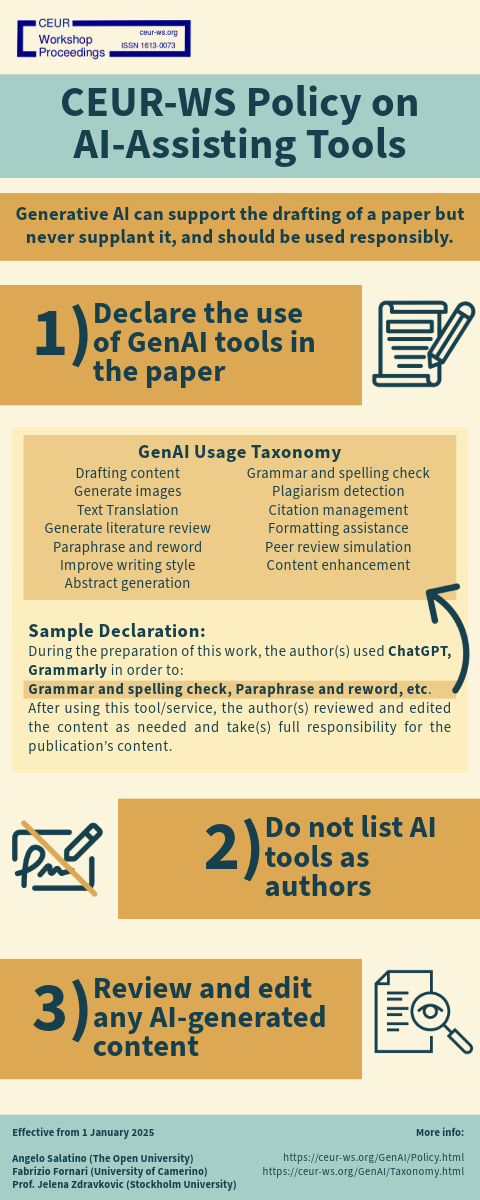
This CEUR-WS Policy on AI-Assisting Tools aims to be transparent about how authors, readers, reviewers, and editors should approach Generative AI (henceforth GenAI) tools when writing papers later published at CEUR-WS. CEUR-WS will keep monitoring the development of such technologies and reserve the right to update this policy as needed.
If you, the author, use GenAI tools for writing they should only support you in drafting and improving your writing, not doing the core writing tasks on your behalf. Tasks like developing scientific insights, drawing conclusions, or making recommendations should be performed by human authors. CEUR-WS hereby requests you to:
CEUR-WS requires that all authors and workshop editors adhere to these guidelines. Their violation will lead to the removal of the published paper or the whole volume, similar to our procedures dealing with plagiarism.
A sample of acceptable use cases of GenAI within CEUR-WS publications are exemplified here, alongside notable exceptions where their employment would be deemed unacceptable.
| Use case | Acceptable | Unacceptable |
|---|---|---|
| Text Creation | While GenAI can assist with writer's block or retrieving definitions, its use should be contingent upon human critical thinking and judgment to ensure accuracy and originality. | Using GenAI to generate new text, such as paragraphs, or even entire sections of a paper is ethically unacceptable. Academic writing must be original and attributed to human authors. |
| Text Translation | This involves using GenAI to translate text from another language into English or vice versa. | Employing GenAI to translate a previously published work into English, without subsequent editorial refinement, raises ethical concerns about self-plagiarism. |
| Sentence Polishing | GenAI can be used to identify and correct grammatical errors, typos, and other writing mistakes. This helps improve the clarity and professionalism of your writing. | GenAI's ability to process large textual data allows it to seemingly process minor sentences to whole paragraphs. Refining whole paragraphs without human critical thinking and judgment can perpetuate biases from its training data and erode the author's narrative voice. |
| Image Creation | GenAI can create images based on text prompts. This is acceptable only when the paper's core topic is about automatic image generation. | Employing GenAI to create visual aids, such as diagrams, charts, and illustrations is unacceptable. The generated output is often nonsensical, and hinder the quality, trustworthiness, and value of scientific papers. See article on Science Integrity Digest. |
| Rephrasing | GenAI can help you rephrase sentences or paragraphs to improve clarity, conciseness, or style. This can be helpful for expressing ideas in a more sophisticated way. | As stated for sentence polishing, rephrasing without human oversight can perpetuate biases from its training data and erode the author's narrative voice. |
Authors are hereby required to declare and detail the specific contributions of any GenAI tools and services used in the preparation of their work. This ensures transparency and provides readers, editors, and CEUR-WS with a clear understanding of the role GenAI played in the production of the published work.
This disclosure must include the following:
During the preparation of this work, the author(s) used ChatGPT, Grammarly in order to: Grammar and spelling check, Paraphrase and reword. After using this tool/service, the author(s) reviewed and edited the content as needed and take(s) full responsibility for the publication’s content.
Explore GenAI Usage TaxonomyPlease note that both LaTeX and LibreOffice Template already include this new section.

Usage of the CEUR-WS Policy on AI-Assisting Tools is permitted for content and scientific events not published via CEUR-WS, subject to attribution.
This CEUR-WS Policy on AI-Assisting Tools comes into effect from 1 January 2025, replacing CEUR's GenAI policy established in 2023.
[1] It's important to note that while the new AI policy for CEUR-WS starts on 1 January 2025,
the requirement for authors to declare their use of AI tools will be mandatory from 1 June 2025. This grace
period allows authors time to adjust to this policy change.